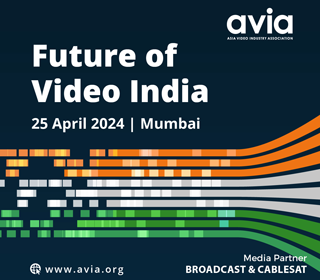Perspective
Innovation, Origination, and Ownership is the Need of the Hour

The film industry seems to have come of age; the front rows of the hall at this annual event are no longer graced by just glamorous film stars but senior management in suits and ties, raring to close deals and do business. Having said that, it is surprising that in spite of this ind ustry being one of the sunrise industries, over the years, there have been such few founders, leaders, and entrepreneurs. This industry needs an entrepreneurial spirit.
Another disturbing thought that comes to mind is the negligible investment that has gone into the media industry. The e-commerce sector, the food technology sector, and the delivery sector seem to have invited more interest from the investors than the media and entertainment sector. Of course, there are rare exceptions. Newscorp and 20th Century Fox have had made deep investments in the country from way back in the 1992s and onwards, and now more recently Disney with the acquisition of Fox and Star. Why is it that a games-originated company like Tencent in China has three times the market cap; albeit in the last six months it has reduced to two times, of the number-one global media company, the Walt Disney Company.
I would like to focus on two broad themes today – consolidation, which I think in many ways leads to disruption, and the second my introspection, with the caveat that of things that I envy in the sector and what I don’t envy, and again with full disclosure that I have been guilty of creating some of these models myself and doing many of the things that I can right now talk with gumption from the outside. I have been very much part of the insider circle when many of these things happened, the good and the bad.
Consolidation sounds like a big word, but it actually means in some form the company has run out of innovation and creative ideas and likes what they see in the other company and would like to buy it. Unfortunately, case studies show that maybe two out of 100 acquisitions are successful. For others, it’s really downhill from there. For many companies, consolidation is growing with a larger balance sheet instead of with profit. To simplify, it might take USD 500 million to build a business over five years, but if it can be acquired for USD 700 million, it is the preferred option. Three years later, a non-cash write-off of 50 percent can be taken, if things did not work out at that level, but it has been a growth engine. To me, one of the biggest challenges, the biggest enemy of consolidation is culture and ego. India is expected to be at the centerpiece of many such options. And the big challenge for many will be to be able to understand that part. There is a reason why Netflix, primarily a content company, has been successful over the last few years. YouTube and Google could have done pretty much that over the last decade. When a company has depth in technology, it always looks at the creative aspect, in some form, as an outsider and vice versa. These are elements to really introspect on.
A fantastic landscape has recently emerged, which deserves mention. AT&T, a telecom company, bought Time Warner. And the most creative media company in the world, The Walt Disney Company, acquired a major part of the most entrepreneurial media company in the world, 20th Century Fox. And then Comcast, which had a history of five years back, looking to acquire Disney, but was then rebuffed by the management, made a counter and competitive bid for 20th Century Fox. And of course, the smartest media entrepreneur in the world is sitting by and watching the value of his company go up by USD 20 billion, while two bidders up the bid. And then there is more disruption as Comcast acquires Sky, which is pretty much half of what the international global part of the business of 20th Century Fox was bought for, though I think this was a win-win situation because it’s not a phenomenal asset for Disney to own. But being a telecom company it was interesting for Comcast to get a head start on. This experience can be narrowed down to the incredible asset, Star India, and a phenomenal local business, Zee TV; there seems to be a sense of consolidation in that space. It would be quite ironic if Comcast were to look at Zee and then you would get these major assets, and to some extent India is a little bit of the playing field of what that goes. I thought it was a little bit relevant to give this context and history. These are tectonic shifts that happen. We have an incredibly ambitious company in Jio. It’s no longer a telecom company, never was. Mr. Ambani made it quite clear from the beginning that he was looking at this being a sort of an integrated company. So Viacom 18 was consolidated into Jio. If you look at some of these landscapes, there has been a phenomenal amount of change and in some ways we are sitting on a very exciting doorstep of where we want to go.
I do worry about a few things though.
Firstly, I think India is one of the least regulated countries, when it comes to media. Sure we have a few anomalies, where 100 percent of a cable company or a DTH company cannot be owned by one entity, but by and large to run a broadcast network, it is not required to be a resident of this country, as it is in the United States. You can fly in on your private jet for three days, go back, and you can still own a network in this country. So it’s substantially unregulated. Overall, I think we are about the last, really large market. China is pretty much shut out for the world from any point of view when it comes to media and entertainment. Therefore, there will be the need to strike a good balance in ownership versus just being the playing field for global organizations.
Briefly, I wish to talk about the aspects that I do not envy.
Ironic as it may sound, I do not envy the broadcasting sector, because I wonder where it will go from here. Most of the sector has not been able to really, really innovate. The companies that could have, have broken out and many of them have innovated. Star is the exemplary model, whether in sports, Hotstar, or its very diverse view of looking at the entire spectrum of business. But, by and large, the broadcasting sector does not have my envy. It is a challenge to figure out what is the next level of innovation. If you look at the kids segment today, the definition of kids is going through an overhaul. I mean there is no more a concept of a 4–14 age group which was, when we launched Hungama kids’ channel. The youth space is substantially disrupted and most of them have pretty much gone out of television and broadcasting viewership, completely and totally. If you look at news, yes we’re in an election year and there’ll perhaps be 10 new channels that will spring and then nine will go off. But there’s a sense of resilience there. I think it’s almost one news channel, per news anchor. If we have seven more new anchors, there’ll be seven more news channels that might be launched, and a couple just a day before elections too. If you look at the English space, both in terms of movies or otherwise, very challenging in terms of where do we bring in the next level of innovation. Because again, nobody’s really looking at appointment viewing; everyone’s looking at the on-demand viewing, everyone’s looking at binge watching. Consumer trends have changed substantially and now with the regulations where the consumer can choose, it’s a challenging time; so good business to be in but not something that one can envy from the outside.
Cinema is today as insular as it can get. Having been part of the industry, the kind of scope it offered to actually blowout has been incredible. But ability to innovate, to harness, to take feedback, to understand what the consumer really wants have been restricted to celebrating being part of the hundred-crore-rupees club. And with inflation, the hundred-crore-club is perhaps ten crore today. These are the different sandboxes that we need to necessarily break out of.
Another sector that I would not envy is the cinema theater business. It’s a tough business. A high-debt, a high-rent business with all the companies publicly listed. A long-term view on anything cannot be taken, as it is more prudent to take a quarter-on-quarter view. And many parts of the decision-making process are alienating the cinema and the creative factions of that. One of them is that we have been trying to get content down from two-and-a-half hour storytelling to a tight two hours. Cinema shows with a snack break and with 15 minutes of advertising have pretty much scared off the younger audience from even wanting to come to see a movie in a theater.
What I do envy is the content sector. I think it is poised for a good five-year honeymoon. Honeymoon because I have been through three or four of the cliffs and the abyss of the content cycle to fathom when it is a honeymoon phase and then when comes the settling down. And sure, there have been 100–150 television producers; this number will go up to 400 and then back to 150. It offers a phenomenal opportunity. But unless we can consolidate and get some scale into that business, it is a challenge. And what is worrisome is that our thinking is not one where we are looking at originating ideas, taking the risk, owning the intellectual property; it stays focused on just being a work-for-hire. So, it’s an extremely interesting and enviable sector but not to that extent.
Sports, and I don’t mean necessarily buying of rights, creating the multiplicity of sports is what this country needs. We are one of the few countries in the world, where sports can be and is in many aspects a strong form of both media and entertainment and a big driver for subscription and advertising revenues. The investment we need to make into the ecosystem of sports is incredible. It’s just about starting up. No doubt, it will have its ups and downs but it’s for the long haul. Many of you looking at career options can see this as a sunrise industry.
The third one is platforms, but it is for those who can afford and be able to get large pay platforms.
The fourth for me is anything that we’re doing in the creative form for the 14–24 age group. But it’s a B2C and not B2B business because that I think is really where the future is. They’ve moved away. We can get their attention span and that primarily means everything that’s interactive. Everything that’s games and many of the other aspects that is not yet so clearly defined when we look at the media and entertainment business. I think everyone talks about it on the periphery but it’s the core. India offers an incredible opportunity to leapfrog here.
And the fifth, but definitely not the last, is the edutainment sector. In my second innings that is what I am focusing on – education, specifically in terms of learning. Having worked on both parts and having been substantially involved in the education business for the last five years, at the end of the day, learning is storytelling, telling stories in an enthralling manner. If you ask a Harvard student what he recalls most of the two-year MBA program, it will be the great case studies. In many ways, education and learning, which at the moment is perceived as an independent sector, is an inherent part of the media sector. And when you bring all of that together in a confluence I think it makes a great story.
As a closing comment, the companies of tomorrow, even in the media sector, really need to be consumer companies and not media companies. And I am hoping, in the next five to eight years, not in the next 20, we will not just be calling them the media and entertainment companies but the consumer companies of tomorrow. And the reason I say this is because we need to introspect as to how much of our attention goes to the core consumer versus the core advertiser or the core stakeholder, be it the shareholder or an investor in the company. And I think not as much as this sector needs it to be. So if we look at the consumer companies of tomorrow, no doubt there are some that are moving in that direction; television is going to be a mainstay. It’s a 50-50 between a B2B and a B2C business. Films, but pretty much the way I think Walt Disney does it because they have got the most incredible movie model now in the world. It’s only about less for more and it’s only about building global franchises that touch it in multiple ways. And that’s incredible; it’s a pure B2C business.
I would like to end by just leaving one thought here. If we can set our minds on being less and less a company of arbitrage, of just being a service model, an organization or a country where we just work for hire, but look more in terms of innovation, origination, and ownership, that is where we need to be!
Screwvalla is also founder UTV 1990–2014, which was acquired by Disney in 2012 for `2000 crore.









You must be logged in to post a comment Login